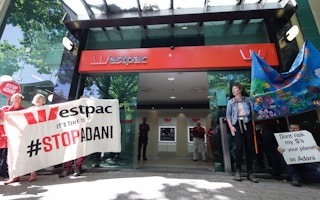After facing months of acrimonious public protest, Australian banking giant Westpac on Friday released a new Climate Change Action Plan that rules out the possibility of financing Indian conglomerate Adani’s controversial mine in Queensland’s Galilee Basin.
In the third iteration of its action plan, Westpac promises to limit lending for thermal coal—that is, coal used for energy generation—to existing coal producing basins, meaning Adani’s proposed Carmichael coal mine will not be eligible for financing.
The bank also said that mines would have to have an energy content of at least 6,300 kilocalories per kilogram to qualify for funding. Adani’s mine fails this requirement too, as the company has said its coal would have only 4,950 kilocalories per kg.
Other strategies to tackle climate change in Westpac’s action plan include an A$10 billion target for lending to climate change solutions by 2020, pledging to reduce the bank’s own carbon emissions, and improving how the bank reports on its climate change performance.
Brian Hartzer, chief executive officer, Westpac, said in a statement that “Westpac recognises that climate change is an economic as well as environmental issue, and that banks have an important role to play in assisting the Australian economy to transition to a net zero emissions economy.”
Westpac is the last of Australia’s “big four” banks to rule out financing for Adani’s mine, with Commonwealth Bank, National Australian Bank, and the Australia and New Zealand (ANZ) Banking Group having done so between 2015 and 2016.
For its reluctance to rule out funding the controversial mine, which activists and industry observers say will destroy wildlife habitats including the Great Barrier Reef, emit 4.7 billion tonnes of greenhouse gases, and trample the rights of indigenous communities, Westpac has drawn heavy criticism from environmental activists and citizens alike.
Actions against the bank included public protests outside various branches of the bank and at its 200th birthday celebrations earlier this month, and guerilla activism tactics such as light projections on its buildings as well as anti-coal messages pasted on to its ATM screens.
Adani responded to Westpac’s announcement with a statement that it remained “fervently committed” to the project, with a spokesman telling The Guardian that Westpac and other Australian banks were choosing to ignore an investment opportunity and bowing to environmental activists instead.
Nationals party senator Matthew Canavan, who is Minister for Resources and Northern Australia, also reacted angrily to the news, delivering a press conference where he accused Westpac of “listening to the noisy activists in Sydney rather than the job-hungry people in Queensland”.
This is despite the fact that Adani’s own representatives have testified that the project will only create the equivalent of about 1,464 full-time jobs, not the 10,000 that Adani claims.
Going on to call Westpac and other corporations that have made similar decisions “wimps” for meeting activist demands, Canavan urged people to do business with banks that were “backing the interests of Queenslanders”.
“
It is time for our politicians to grow a spine, show some much needed climate change leadership and send Adani packing.
Gemma Borgo-Caratti, national director, Australian Youth Climate Coalition
Activists, meanwhile, welcomed Friday’s announcement. Blair Palese, chief executive officer of anti-fossil fuel campaigning group 350.org Australia, said in a statement that Westpac’s decision is “an enormous blow to this project and the future of coal in Australia after sustained community pressure from the country”.
“The Federal and Queensland governments are becoming increasingly isolated as businesses and international investors refuse to touch coal and the Adani project,” she added.
The Federal Government, for instance, is considering a loan of nearly A$1 billion of taxpayer money to Adani via the Northern Australia Infrastructure Facility (NAIF). NAIF has been criticised for being secretive about this loan, denying Freedom of Information requests about matters such as conflicts of interests and board meeting schedules.
Meanwhile, the Queensland government, earlier this month granted Adani a license that will give it “unlimited access” to water from the Great Artesian Basin, which is one of Australia’s most precious groundwater resources, and, according to the government, “a vital resource for pastoral, agricultural, extractive industries town water supply and springs”.
The permit, which is valid until 2077, has been slammed as “bloody-minded and barbaric” by farmers in the region.
Gemma Borgo-Caratti, national director of activist group Australian Youth Climate Coalition, commended Westpac’s decision to rule out financing for the mine, and called on other Australian Banks to develop policies to move away from fossil fuel funding.
Opposing Adani’s mine is a “no-brainer”, said Borgo-Caratti, adding that activists would not stop until the mine was “dead and buried”.
“It is time for our politicians to grow a spine, show some much needed climate change leadership and send Adani packing,” she added.

















